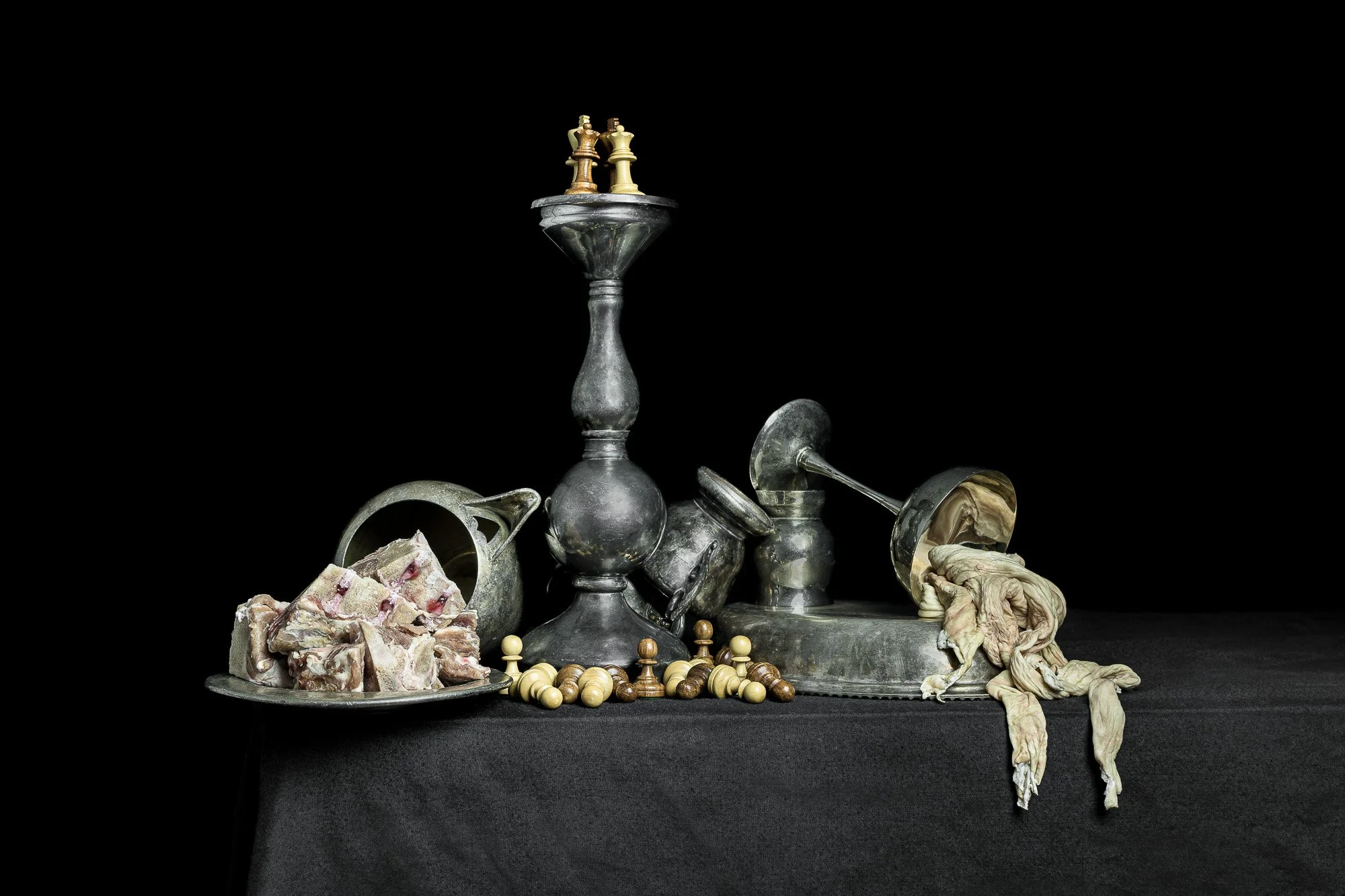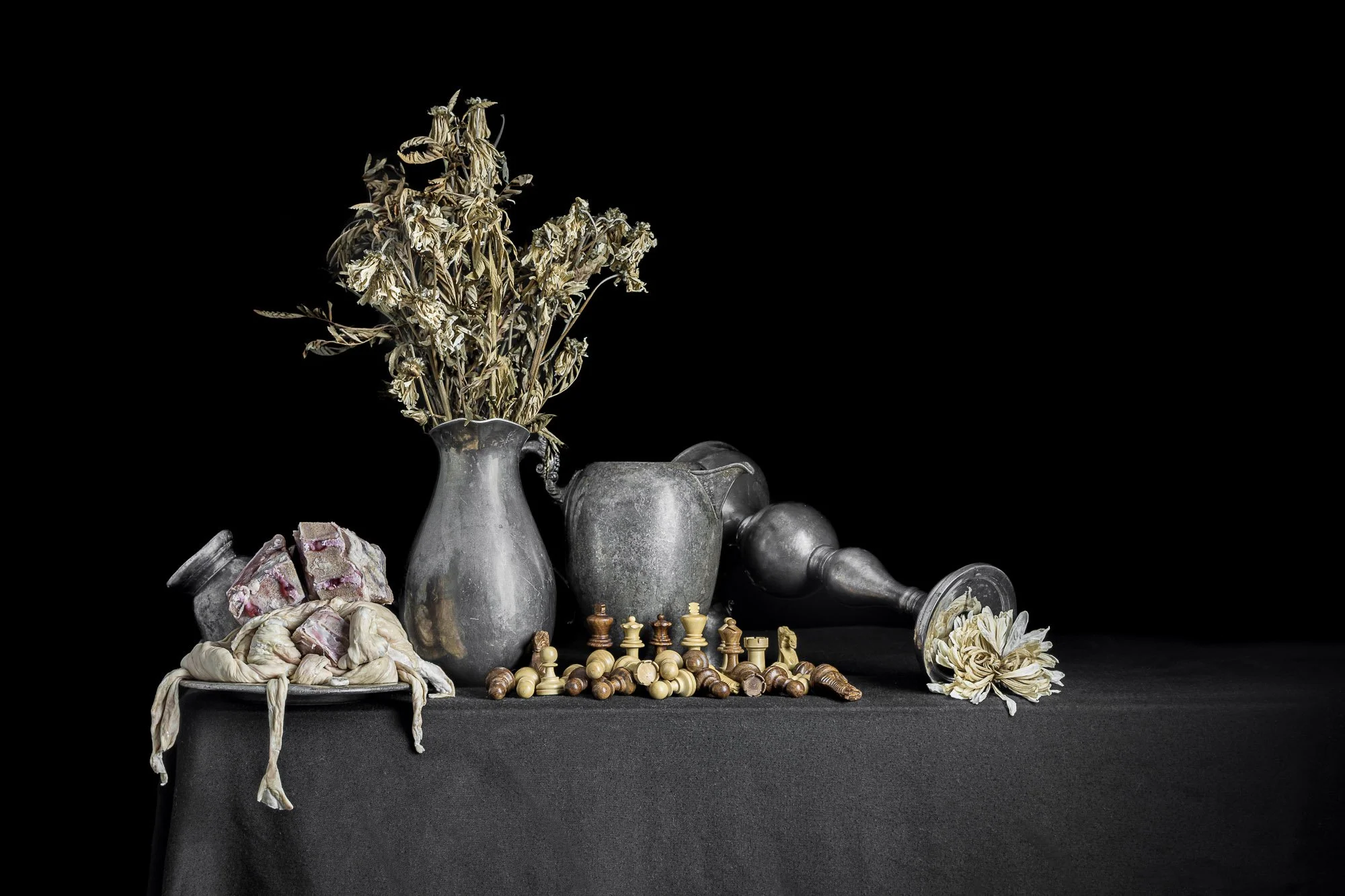War is Vanity
Vanitas with Chess Set, by Neal Auch (2022)
In Ingmar Bergman's classic film, The Seventh Seal, a soldier is confronted with his own mortality and challenges the personification of death to a game of chess. Our protagonist knows that he cannot win, but he hopes to prolong the game—and therefore his life—just long enough to perform “one meaningful deed.”
The idea of chess as a metaphor for life is so pervasive that it almost feels cliche. (Indeed, the aforementioned chess game with death has been parodied countless times, including in Bill & Ted’s Bogus Journey.) And it's easy to see why "life is chess" appeals to us. It’s a game of almost infinite complexity: every match starts out the same but, depending on the choices we make, the march toward destruction can unfold in countless different ways. Perhaps there is also something comforting in the fact that chess is a domain of perfect objectivity and rationality: the rules are well-defined and known to all players; there is no trace of randomness or chaos on the chess board, save that introduced by the machinations of the human mind.
Of course, the game of chess is not at all designed to represent life—it’s a simulacrum of war.
Still Life with Weapons and Banners, by Willem de Poorter (1634)
War was a frequent subject of 17th-century Dutch Vanitas paintings. Willem de Poorter’s 1634 painting Still Life with Weapons and Banners is representative of the sub-genre. In the background we find a sceptre and crown—clear references to the great powers of the Emperor. Scattered throughout the foreground we have various implements of war: a quiver, a suit of armour, and a bundle of spears. The human skull, nearly concealed in shadow, reminds the viewer of the tragic cost of war. A brilliant blue banner divides the scene diagonally, perhaps echoing the separation between the Emperor (who decides when war must be fought) and the soldiers (who do the actual fighting). On closer inspection, we notice that the Emperor’s crown and sceptre have been placed upon a sarcophagus. Perhaps this is a reminder that, for all his great power, the Emperor’s fate will be no different from that of his soldiers. In the end, all that will remain are hollow symbols of the vanity of a man whose body is now reduced to bones, and whose vast empire will crumble in due time.
This series of Vanitas compositions explores the idea of chess as a metaphor for both life and war. Precariously placed goblets, extinguished candles, and dead flowers suggest the brevity and uncertainty of life. Although bones have been my go-to choice of memento mori lately, here it seemed more fitting to opt for gore and intestines, echoing the idea that those who fight our wars are sometimes seen as little more than meat by the handful of powerful elites pulling the strings. The cross draped in gore nods to the perverse and disingenuous ways that rulers throughout human history have sought to rationalize and justify their vain pursuit of power. Echoing De Poorter, I have conspicuously placed the higher status pieces at a remove from the pawns. In one image, the kings and queens tower high above the fallen pawns—a reminder that those who start wars rarely face their consequences.
Still Life with Chess Set, by Neal Auch (2022)
I think that there is something very telling about how easily we accept the “chess is life” metaphor. We are so very quick to accept the assumption that the game of life is zero sum, that for one group to thrive another must be subjugated, that the sacrifice of countless pawns is a fair trade for the life of a single king. And, indeed, it may well be that the metaphor works because the drive to sectarian violence is intrinsic to our species. But maybe not… Maybe this is nothing more than a story that we have been told—a narrative advanced by a few craven men who seek to wield disproportionate power over the rest of us. Perhaps, at some far-removed moment in human history, we had a choice.
Perhaps at one point there was an opportunity for us to play a different game.
Still Life with Chess Set, by Neal Auch (2022)



